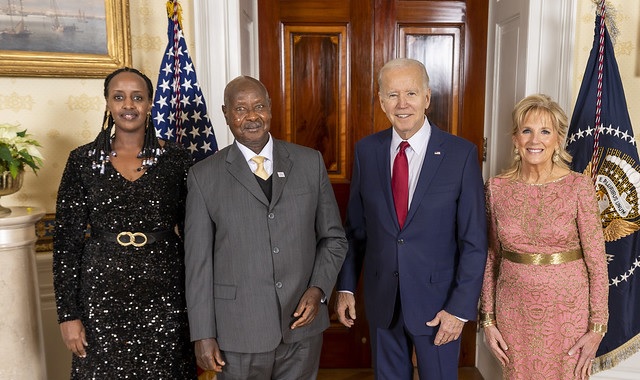
Why Uganda and others were not disappointed
COVER STORY | Ian Katusiime | President Yoweri Museveni got at least one major deal on the sidelines of the just concluded US-Africa Leaders Summit in Washington DC, US.
The President managed to get the U.S. group, Albertine Graben Energy Consortium (AGEC), to agree that a Final Investment Decision for the $4.5 Billion East Africa Energy Security And Transition Investment Project in Uganda whose centerpiece is a crude oil refinery, will take place in 2023.
Although there was a dedicated “Deal Room” and a full-fledged business forum, it appears not many deals were cut for Uganda. Only a few leaders managed to meet privately with U.S. President Joe Biden on the sidelines of the summit as he did not schedule any such engagement outside of the photo-op at the White House.
Biden met with leaders of six African nations facing elections in 2023 and urged them to ensure that balloting is free and fair. At a private meeting at the White House were leaders from the Democratic Republic of the Congo, Gabon, Liberia, Nigeria, Madagascar, and Sierra Leone to discuss elections and democracy in Africa. For that Biden was joined by Secretary of State Antony John Blinken , National Security Advisor Jake Sullivan, and Samantha Power, the administrator of the US Agency for International Development.
Others, such as Kenyan President William Ruto, managed to meet separately with U.S. Secretary of State Blinken on the sidelines of the Summit. Apparently, the bilateral meetings with African Presidents at the summit were being conducted by US Secretary of State Blinken and not his boss, Biden. Blinken said Kenya was a strong commercial and trade partner of the U.S. and praised the country’s leadership in addressing critical regional security challenges in northern Ethiopia, eastern Democratic Republic of the Congo, South Sudan, and Somalia.
The Summit which took place from Dec.13-15, unlike the 2014 one under then-president Barack Obama, did not have any obvious superstars. And, although it had a designated deal room, it would appear that only a few African leaders managed to cut any immediate bilateral deal with the U.S. at the summit. Instead, most deals cut were multilateral and ranging from mid-term to long-term.
Three major announcements were made at the summit.
First was the announcement of Ambassador Johnnie Carson, who has worked with African nations before, to oversee implementation of outcomes of the summit.
“As every leader here understands, the real measure of success is not in announcements, but it’s in the follow-through,” Biden said, “Many of you already know him personally. You certainly know his skill and his reputation. So you know that he’s going to make sure we translate our commitments on paper into progress that people can see in their daily lives.”
Biden also announced formation of the President’s Advisory Council on African Diaspora Engagement in the United States. He said it would enable tapping into “the enormous strength of the diaspora communities here in the United States”.
Finally, Biden announced that he would be visiting Africa.
“I’m eager to visit your continent,” he told the leaders, “Well, I’m looking forward to seeing many of you in your home countries.”
Analysts say the summit cements Biden’s reported view that “Ignoring Africa is a mistake”.
“The summit is really rooted in the recognition that Africa is a key geopolitical player and one that is shaping our present and will shape our future,” a senior official is quoted to have said. Russia is also gearing up for a second Russia Africa summit next year.
Biden’s plan behind the summit is to counter China and Russian dominance over Africa with his own charm offensive. And it makes business sense for America.
Africa has some of the fastest-growing economies in the world when measured by the year-by-year rise in gross domestic product, with emerging opportunities in car manufacturing, high-technology, and a Nollywood-led film industry. Its young, arable land, and natural resources (iron ore, cobalt, lithium, copper, uranium, manganese and many more) are a major attraction.
In his speech, Biden took potshots at China without mentioning it by name but for the African leaders and delegates, it was a demonstration of America playing catch up with its geo-political rival. As Biden held a dinner with the leaders at the White House on the last day of the summit, there was a feeling of little takeaways from the event.
Biden promises
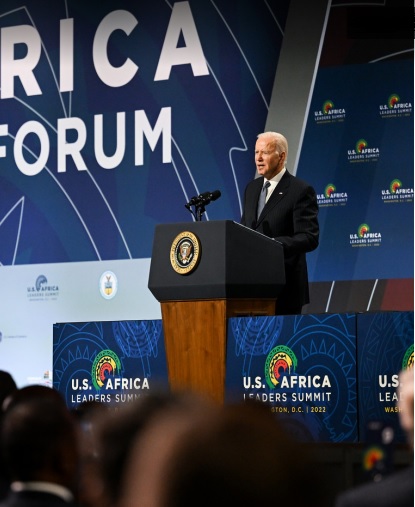
By the time we went to press, however, the final briefing on the Outcomes of the U.S. Africa Leaders Forum with Under Secretary of State for Economic Growth, Energy, and Environment, Jose W. Fernandez had not been issued.
But in his speeches President Biden committed, over the next three years, to spend $55 billion to invest in Africa’s people, infrastructure, agriculture, health, and security. He will also ask the U.S. Congress for the authority to lend $21 billion to the International Monetary Fund to provide access to necessary financing for low- and middle-income countries, mainly in Africa. But Biden spent quite some time on his pet project of promoting democracy and good governance.
“As we engage with your countries, the United States will always lead with our values. Support for democracy, respect for the rule of law, commitment to human rights, responsible government — all are part of our DNA,” he told the African leaders, some of who are dictators, election snatchers, and pseudo democrats.
“We see over and over again that our greatest power is our people,” Biden said, “So one of the new commitments I want to highlight today is the investment in countering democratic backsliding through our new African Democratic and Political Transition initiative.”
He pledged $75 million to strengthen transparent, accountable governance; facilities — facilitate voter registration, support constitutional reform, and more. Although not spoken the implicit message is clear; non-democratic leaders will not benefit and could face sanctions.
Biden said he would be piloting a US$100 million program to boost reforms that build their security capacity in Africa.
Few disappointments
Going into the summit, there were remarkably few expectations from Uganda and other African countries. That means there were few disappointments when it ended.
For Uganda, the expectations were even lower than most African nations as the country has traded barbs with American diplomats over political convulsions at home.
As President Museveni visited the U.S. for the first time since 2017, there was little on what the Ugandan government expected from its longtime partner after years of frigid relations since Museveni’s last visit.
Uganda and the US have had a strained diplomatic relationship in the last four years marked by sanctions on Uganda’s military top brass, civilian leaders, and a fallout over the brutal crackdown on the political opposition by Museveni’s 36-year-old government.
Museveni’s attendance of the summit was seen by analysts as an attempt by both sides to thaw the diplomatic tension between the two countries.
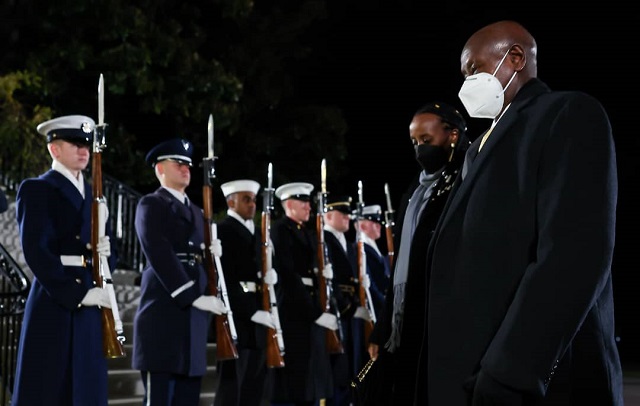
President Biden did not extend an invitation to his Ugandan counterpart for the virtual democracy summit he hosted in December 2021. After a presidential election in January 2021 where Museveni’s opponents were rounded up, held for months and tortured, Biden, new in office, calculated not to include the long-serving Ugandan leader in a summit where virtues of democracy were being extolled.
Any positive aspects of the relationship between Uganda and the U.S. have been seen through rolling back the pandemic such as donation of Covid19 vaccines and medical equipment. American efforts to boost Uganda’s Ebola response were not the usual: the US decided to channel funds for the Ebola fight through partners and international agencies as opposed to direct funding to the Ugandan government—reportedly causing grumbles among Ugandan authorities.
Washington’s apparent dissatisfaction with mismanagement of donor funds in Uganda is a snapshot of the relationship between the two countries in the recent past. While at the summit however, Museveni sought to allay such concerns.
However the friction on the diplomatic front is belied by the strong counterterrorism ties between the two countries. While sanctions and travel bans have hit hard on security and intelligence chiefs, the US Pentagon (Department of Defence) and the Uganda Peoples Defence Forces (UPDF) remain joined at the hip.
In Africa, Uganda remains the largest beneficiary of US military training programs, per a report presented by the Pentagon and the Department of State to the U.S. Congress early this year.
Uganda had 5049 UPDF officers for the trainings that took place among 46 African countries.
Uganda’s neighbour to the south, Rwanda, came second with 2195 trainees and followed by Ghana at 1278. Up to 503 of the UPDF trainees were taken through peace keeping operations, others had international Military Education and Training (IMET) courses and the rest of the training was in the form of miscellaneous activities of the Pentagon. The trainings took place in Uganda and various parts of the U.S.
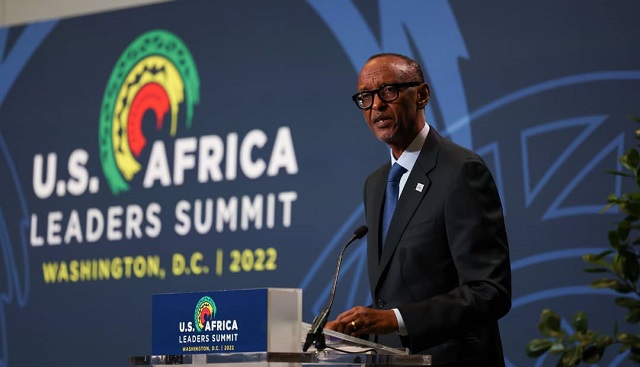
On the larger US-Africa relations, there was not much to expect or even later announced. Unlike the China-Africa summit, where funding of over $60 billion to African nations is declared or where debt relief is announced, there was next to nothing major at the US Africa summit.
Even as there were commitments of $55bn to finance projects over the next three years, there were reports that the money was from previous programs and budgets.
America has longstanding counterterrorism ties with African countries like Uganda, Rwanda, Kenya, Egypt, Somalia etc. The U.S. spends $800bn on its defence budget (larger than the next ten countries combined including Russia and China) and its security engagements are some of its most visible partnerships with Africa.
These are implemented through the U.S. Africa Command (US AFRICOM) which is tasked with U.S. military operations on the African continent. US AFRICOM will be hosting the African Land Forces Summit next year in Côte d’Ivoire.
In March, Uganda was among the seventeen African countries that abstained in a UN vote to condemn the Russian invasion of Ukraine. President Museveni underscored this decision while hosting the Russian Foreign Minister Sergei Lavrov at State House Entebbe on July 26.
“We want to trade with Russia. We want to trade with all countries of the world. We don’t believe in being enemies of somebody’s enemy, no. We want to make our own enemies not fight other people’s enemies,” Museveni said. “It is not my job to be pro-West or pro-East. I deal with people according to my interests,” he added.
Besides, SIPRI, a global arms tracker, indicated that Russia was the largest supplier of weapons for African countries for the period ranging from 2017-2021. Russia’s weapons sales to Africa accounted for 44% of imports of major arms to the continent followed by the US (17 per cent), China (10 per cent) and France (6.1 per cent).
In addition, America did not endear itself to its African partners when months after the Russian invasion of Ukraine, it drafted a law months aimed at punishing African countries that were not on board with the West’s measures against Russia. Termed ‘The Countering Malign Russian Activities in Africa Act,’ the bill had passed the House and was awaiting approval by the US Senate. It would direct the US Secretary of State to counter the influence and activities of the Russia and its “proxies in Africa”—something that infuriated African countries.
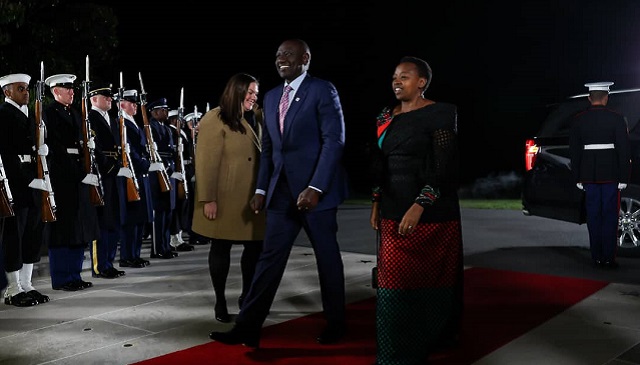
The Southern African Development Community (SADC), during its 42nd Ordinary Summit held in August objected to the law and issued a statement saying the “United States has made the African continent “the target of unilateral and punitive measures.”
Call for collaboration
Museveni addressed a forum on Sustainable Health Cooperation and Health Security. The President talked about Uganda’s strategies to fight epidemics like Covid19 and Ebola; preventive health care and curative interventions but made a plea.
“There are two areas where we are moving on our own, but where we would welcome collaboration, if available. This is in the areas of pharmaceuticals and vaccines,” he said.
Museveni also met the US Undersecretary for Political Affairs, Victoria Nuland where he tweeted that he had a good discussion on “regional security, democracy and human rights in the context of diversity and inclusion.”
While in Washington, Museveni was part of a meeting that discussed the situation in eastern DR Congo attended by Presidents; Evariste Ndayishimiye of Burundi, William Ruto of Kenya, Rwanda’s Paul Kagame Tanzania’s Samia Suluhu and Angola’s Joao Lorenco.
As Museveni flew back home from the event, there was a palpable sense of compromise with Washington even as Ugandan protestors spent days gathered outside the venue of the highly billed summit to protest Museveni’s politics at home. The protestors have become commonplace whenever Uganda sends a delegation to the U.S.■
 The Independent Uganda: You get the Truth we Pay the Price
The Independent Uganda: You get the Truth we Pay the Price



